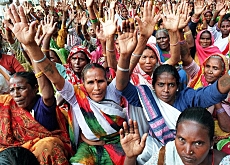Microfinance taps capital markets for loans

A Geneva investment company has launched a new bond to raise money for low-income borrowers in poor countries.
The firm, BlueOrchard, is a pioneer in selling debt on the international financial markets to provide loans for entrepreneurs who otherwise have no source of funding.
The new debt issue is further evidence that funding for microfinance institutions (MFIs) does not have to depend on charity alone. The bond is worth $106 million (SFr137.5 million) and is being sold by the United States investment bank, Morgan Stanley.
BlueOrchard was involved in the first debt issue to attract funding for MFIs in 2004. Since then, the United Nations has been working to raise awareness of the potential of such loans for improving lives and livelihoods, most notably with the UN Year of Microcredit in 2005.
One goal of the designated year was to encourage the private sector to invest in MFIs to give the latter a much-needed credit line in times of insecure foreign-aid budgets, a target that was partially fulfilled.
Spreading the word
“[The UN year] definitely helped to spread the word and increase knowledge about microfinance. But more effort has to be made to educate institutional and private commercial investors,” Jean-Phillipe de Schrevel, a partner at BlueOrchard, told swissinfo.
Funding raised through the BlueOrchard Loans for Development (Bold) will help finance 22 MFIs in 13 countries – mostly in Latin America, with a sprinkling in Eastern Europe and two in Asia.
Other “investment grade” MFIs failed to qualify for Bold financing because much of their cash comes from other sources.
“We would like to have included Indonesia or the Philippines [where] there are good MFIs,” de Schrevel said. “But the problem is they are heavily subsidised by public funds… [and] it’s very difficult to be competitive because of cheap funding from the World Bank and the like.”
Top marks
The qualifying MFIs fulfilled a variety of criteria by scoring top marks in general governance, management, strong shareholder base and transparent reporting. “It’s basically the normal banking due diligence applied to microfinance,” said de Schrevel.
He added that the qualifying institutions – all leaders in their own countries – were also strong financially, with “low default rates, diverse portfolios and good lending methodology”.
Given an average loan of $1,000, the bond issue will provide enough cash to finance 105,000 new and existing micro entrepreneurs.
Funds could also be used to boost institutional infrastructure. The beneficiary MFIs have seen their business grow by between 40 and 50 per cent annually for the past three years and many need a financial injection to upgrade their systems.
Trust
De Schrevel said the MFIs were free to use the loans as they saw fit. “When we lend money to an institution, [we do so] because we trust them.
“Some of the money might be used to open more branches in rural areas, for example, or to recruit new credit analysts to expand the staff numbers. But in the end it’s all more fire power to the institution to increase its [product] portfolio.”
The bond is being targeted at institutional investors, such as pension funds and banks, as well as high-net worth individuals.
BlueOrchard believes investors will be attracted to what it sees as a new asset class, which offers a double bottom line – financial and social returns.
Thanks to the link-up with the investment bank Morgan Stanley, recipient institutions will receive funds in local currencies. This avoids in-flows of foreign cash, which could distort local economies.
As for the future, de Schrevel says BlueOrchard hopes to issue more bonds. “We don’t see [Bold] as a one-shot deal – [it is] a great way of funding the microfinance industry.”
Bold is due to close at the end of March.
swissinfo, Faryal Mirza
Microfinance refers to loans, savings, insurance, transfer services and other financial products for low-income clients.
Microcredit is a small amount of money loaned to a client by an institution often without collateral.
There are some 500 million borrowers worldwide.
Micro enterprises make up 80% of all businesses in developing nations.
The Bold bond securitises unsecured loans in diverse portfolios belonging to participating MFIs.
These institutions are located in:
Cambodia
Ecuador
Peru
Bosnia
Nicaragua
Bolivia
Mexico
Russia
Azerbaijan
Georgia
Albania
Mongolia
Colombia

In compliance with the JTI standards
More: SWI swissinfo.ch certified by the Journalism Trust Initiative



You can find an overview of ongoing debates with our journalists here. Please join us!
If you want to start a conversation about a topic raised in this article or want to report factual errors, email us at english@swissinfo.ch.